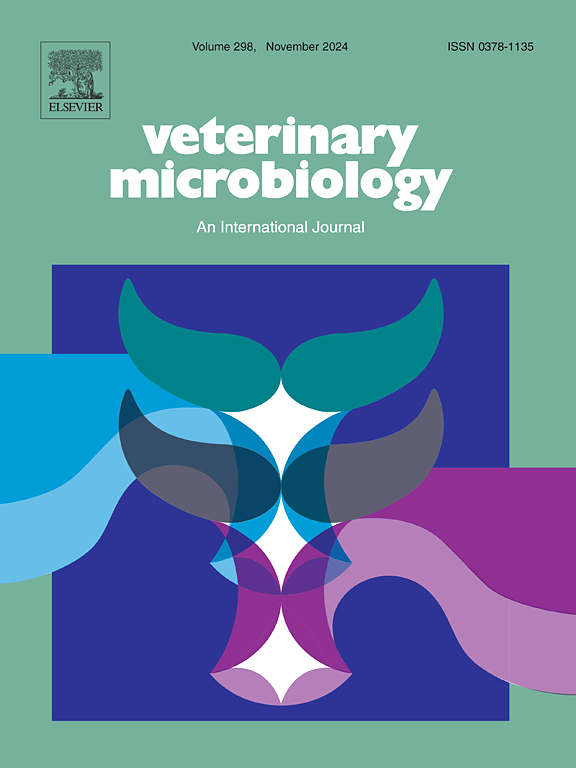Construction of HiBiT-tagged porcine deltacoronavirus via NanoBiT split-luciferase system and its utility in antiviral research
IF 2.4
2区 农林科学
Q3 MICROBIOLOGY
引用次数: 0
Abstract
Porcine deltacoronavirus (PDCoV) is a novel coronavirus that causes acute diarrhea and high mortality in piglets, and poses a significant threat to public health due to its potential for cross-species transmission. HiBiT is a tag that can bind to LgBiT to restore NanoBiT activity, and it can be inserted into viral genomes to generate reporter viruses. In this study We successfully constructed an infectious clone of PDCoV using the transformation-associated recombination (TAR) technique in yeast. The rescued virus exhibited biological characteristics similar to those of the wild-type strain. Based on this infectious clone, we insert a HiBiT tag into the NS6 gene and successfully rescued the recombinant virus, which also showed comparable biological properties to the wild-type virus. The functionality of the HiBiT reporter gene was validated using two antiviral compounds and compared with an eGFP-tagged reporter virus. The results demonstrated that the PDCoV reporter virus carrying the HiBiT tag provided stronger peak signals, higher sensitivity, and better genetic stability for antiviral drug screening These findings suggest that the HiBiT-tagged PDCoV is a robust tool for antiviral drug discovery and can facilitate the development of therapeutics against PDCoV.
利用NanoBiT分裂荧光素酶系统构建hibit标记猪三角冠状病毒及其抗病毒研究
猪三角冠状病毒(PDCoV)是一种新型冠状病毒,可引起仔猪急性腹泻和高死亡率,并因其跨物种传播的潜力对公共卫生构成重大威胁。HiBiT是一种可以与LgBiT结合以恢复NanoBiT活性的标签,它可以插入到病毒基因组中以生成报告病毒。本研究利用转化相关重组(TAR)技术在酵母中成功构建了PDCoV的感染性克隆。获救的病毒表现出与野生型毒株相似的生物学特性。基于该传染性克隆,我们在NS6基因中插入HiBiT标签,成功地挽救了重组病毒,重组病毒也显示出与野生型病毒相当的生物学特性。使用两种抗病毒化合物验证HiBiT报告基因的功能,并与egfp标记的报告病毒进行比较。结果表明,携带HiBiT标记的PDCoV报告病毒在抗病毒药物筛选中具有更强的峰值信号、更高的灵敏度和更好的遗传稳定性。这些发现表明,HiBiT标记的PDCoV是一种强大的抗病毒药物发现工具,可以促进针对PDCoV的治疗方法的开发。
本文章由计算机程序翻译,如有差异,请以英文原文为准。
求助全文
约1分钟内获得全文
求助全文
来源期刊

Veterinary microbiology
农林科学-兽医学
CiteScore
5.90
自引率
6.10%
发文量
221
审稿时长
52 days
期刊介绍:
Veterinary Microbiology is concerned with microbial (bacterial, fungal, viral) diseases of domesticated vertebrate animals (livestock, companion animals, fur-bearing animals, game, poultry, fish) that supply food, other useful products or companionship. In addition, Microbial diseases of wild animals living in captivity, or as members of the feral fauna will also be considered if the infections are of interest because of their interrelation with humans (zoonoses) and/or domestic animals. Studies of antimicrobial resistance are also included, provided that the results represent a substantial advance in knowledge. Authors are strongly encouraged to read - prior to submission - the Editorials (''Scope or cope'' and ''Scope or cope II'') published previously in the journal. The Editors reserve the right to suggest submission to another journal for those papers which they feel would be more appropriate for consideration by that journal.
Original research papers of high quality and novelty on aspects of control, host response, molecular biology, pathogenesis, prevention, and treatment of microbial diseases of animals are published. Papers dealing primarily with immunology, epidemiology, molecular biology and antiviral or microbial agents will only be considered if they demonstrate a clear impact on a disease. Papers focusing solely on diagnostic techniques (such as another PCR protocol or ELISA) will not be published - focus should be on a microorganism and not on a particular technique. Papers only reporting microbial sequences, transcriptomics data, or proteomics data will not be considered unless the results represent a substantial advance in knowledge.
Drug trial papers will be considered if they have general application or significance. Papers on the identification of microorganisms will also be considered, but detailed taxonomic studies do not fall within the scope of the journal. Case reports will not be published, unless they have general application or contain novel aspects. Papers of geographically limited interest, which repeat what had been established elsewhere will not be considered. The readership of the journal is global.
 求助内容:
求助内容: 应助结果提醒方式:
应助结果提醒方式:


